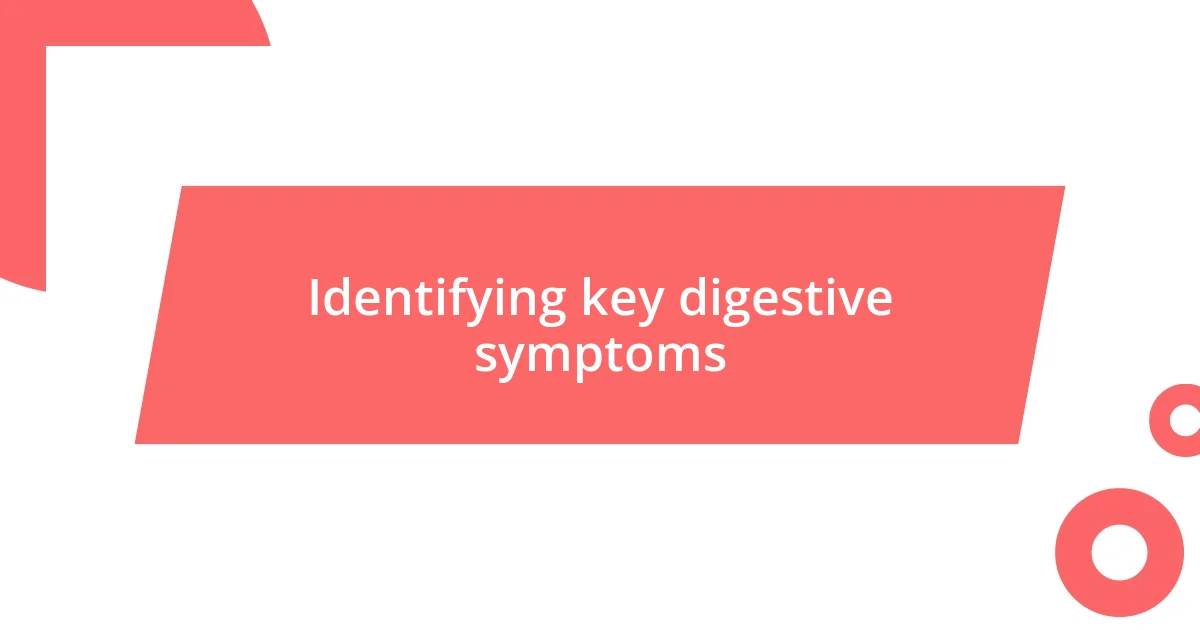Key takeaways:
- Recognizing symptoms like bloating, gas, and heartburn is essential for understanding and improving digestive health.
- Incorporating natural remedies, such as ginger, peppermint, and fiber-rich foods, can significantly enhance digestion.
- Creating a personalized digestion plan through food journaling and hydration awareness can lead to long-term digestive health improvements.

Understanding digestion issues
Digestion issues can manifest in various ways, from bloating and gas to more severe conditions like IBS (Irritable Bowel Syndrome). I remember a period in my life when I felt constant discomfort, nearly every meal became a gamble. It’s frustrating to navigate life while feeling like your stomach is always in turmoil, isn’t it?
Understanding the root causes of these issues is crucial. Factors like stress, poor diet, and lack of hydration can wreak havoc on our digestive systems. Once, I realized my hectic lifestyle was contributing to my gut woes—skipping meals and scribbling down snack choices while running to my next appointment had begun to catch up with me.
Additionally, the role of the gut microbiome can’t be overlooked; it’s fascinating how the bacteria in our intestines directly influence our digestion and overall wellness. Have you ever wondered how a simple change in your daily routine or eating habits could restore balance? For me, introducing fermented foods transformed my experience—what a game changer that was!

Identifying key digestive symptoms
Identifying digestive symptoms can often feel like piecing together a puzzle. For me, it was essential to recognize how my body communicated its needs. Over time, I learned to pay close attention to subtle signs.
Here are some key symptoms to watch for:
- Bloating: That uncomfortable, swollen feeling after meals can often signal excess gas or food intolerances.
- Gas: While it’s normal to have gas, persistent or painful gas could indicate a problem.
- Heartburn: A burning sensation in the chest may point to acid reflux, often triggered by spicy or fatty foods.
- Constipation or Diarrhea: Fluctuations in bowel movements can reflect dietary issues or stress levels.
- Nausea: Frequent feelings of sickness or an upset stomach can hint at a more significant digestive imbalance.
- Fatigue After Eating: Feeling unusually tired post-meal may suggest that your body is struggling to properly digest food.
Recognizing these symptoms was a pivotal moment for me. I remember feeling overwhelmed and uncertain but gaining insight into my own digestive health helped me take control of my well-being. By keeping track of what I ate and how my body reacted, I realized patterns that were previously invisible, and that made all the difference on my journey to better digestion.

Exploring natural remedies for digestion
Exploring natural remedies for digestion can feel like embarking on a personal journey to wellness. I remember my first foray into this world when I stumbled upon ginger tea during a particularly tough bout of bloating. The warm, spicy infusion was a comforting reprieve, and to my surprise, it eased my discomfort almost immediately. I began to wonder how many other natural solutions were waiting to be discovered.
Herbs and natural ingredients often carry a wealth of benefits. Take peppermint, for example; it’s not just a delightful flavor in candies but has been a staple in aiding digestion for centuries. After incorporating peppermint oil capsules into my routine, I noticed a significant reduction in my post-meal bloating. It felt liberating to find something so simple yet effective. Have you tried using fresh herbs in your cooking? They can truly elevate your meals and your gut health simultaneously.
Now, let’s not forget about fiber’s crucial role in digestion—it’s like a natural broom for our intestines. I began adding more fruits, vegetables, and whole grains to my plates, and it was eye-opening to feel the difference. That smooth, efficient digestion was a welcome change! If you’ve had similar experiences with dietary changes, it’s reassuring to know that even small shifts can lead to significant improvements in our digestive health.
| Natural Remedy | Benefits |
|---|---|
| Ginger | Reduces bloating, relieves nausea, and aids digestion |
| Peppermint | Soothes digestive issues and reduces bloating |
| Fiber (fruits, vegetables) | Promotes regularity and improves gut health |

Adopting a balanced diet
Adopting a balanced diet is a transformative journey. I vividly recall the moment I decided to revamp my meals. I had been caught in a cycle of convenience foods, which left me feeling sluggish and uncomfortable. By focusing on whole, nutrient-rich foods, I discovered the vibrancy that naturally comes with a balanced plate. It was such a game changer!
Fruits, vegetables, lean proteins, and whole grains became my staples. I remember tossing a colorful salad packed with leafy greens, tomatoes, and grilled chicken for lunch; not only was it visually appealing, but it also made me feel energized and satisfied. Have you ever experienced that rush of clarity that comes from nourishing your body? It’s exhilarating, and it reminds me why I prioritize healthy eating.
In addition, I learned to listen to my body after meals. When I indulged too heavily, I often felt that telltale heaviness. Instead of resisting cravings entirely, I began to find moderation. For instance, I would pair a rich dessert with a simple fruit plate instead of diving in headfirst. That small change made all the difference; I could enjoy my favorite treats without compromising my digestion. It’s amazing how well our bodies respond when we give them what they really need!

Incorporating probiotics into meals
Incorporating probiotics into my meals was a delightful discovery that has had a lasting impact on my digestion. I started with yogurt, mixing it into smoothies or enjoying it with fresh fruit as a breakfast staple. The creamy texture was a treat, and I could feel that little boost to my gut health. Have you ever tried to fine-tune your breakfast? It can be a simple yet powerful way to set the tone for your day.
Fermented foods like kimchi and sauerkraut became my go-to additions for lunches and dinners. I recall the first time I piled some tangy sauerkraut on top of a warm bratwurst; the flavors paired beautifully and made the meal feel special. Not only did I enjoy the taste, but I felt a sense of accomplishment knowing I was supporting my digestive system with every bite. Who knew eating could also be a win for gut health?
I also began sprinkling probiotic-rich miso into soups and dressings, adding depth to my meals while benefiting my digestion. One evening, I made a miso soup packed with veggies, and not only was it comforting, but it also felt nourishing. It’s fascinating how small changes can lead to such significant improvements. Have you explored the world of probiotics in your kitchen? It’s worth the experiment!

Managing stress for better digestion
Managing stress is crucial for maintaining good digestion, and I can attest to that through my own experiences. When life gets hectic, I find that my stomach often reacts negatively, leading to discomfort or even bloating. Have you ever noticed how stress can tighten your gut? I realized that taking just a few minutes to breathe deeply or step away from the chaos can make a noticeable difference in how I feel afterward.
In my pursuit of digestive harmony, I began integrating mindfulness practices into my daily routine. Incorporating simple techniques like yoga or meditation not only alleviated my stress but also enhanced my overall digestion. I remember one particularly hectic day when I took a moment to practice a few gentle stretches. I felt the tension in my body ease, and almost instantly, my stomach felt lighter. Have you ever felt that release? It’s incredible how our mental state can greatly influence our physical well-being.
Additionally, I started prioritizing time for hobbies that bring me joy and relaxation. I recall the calming ritual of tending to my garden after a stressful week. Being surrounded by nature not only lifted my spirits but also helped me let go of anxiety that could otherwise wreak havoc on my digestion. Finding those small pockets of joy throughout the day has become essential for keeping stress at bay and, in turn, supporting my gut health. What activities do you turn to when you need a moment of calm? They can truly transform your digestion.

Creating a personalized digestion plan
Creating a personalized digestion plan starts with understanding your unique needs and preferences. I can still remember my first step—keeping a food journal. By jotting down what I ate and how I felt afterward, I identified patterns that revealed which foods triggered discomfort and which ones energized me. Have you ever tracked your food intake? It can be eye-opening and incredibly useful in tailoring your eating habits to suit your body’s signals.
Next, I decided to gradually incorporate more fiber into my meals, starting with small and manageable changes. I began swapping out white rice for quinoa and adding a handful of leafy greens to nearly every dish. The first time I tossed quinoa into a stir-fry, I was amazed at how much more filling it felt, while my digestion seemed to thank me for the extra nutrients! Have you explored different whole grains? Sometimes, it’s just about experimenting until you find the combinations that work best for you.
Over time, I recognized that hydration played a crucial role in my digestion as well. At one point, I set reminders on my phone to drink water throughout the day, and it truly transformed my routine. I remember one hot afternoon when I realized I hadn’t had a sip in hours; my stomach felt heavier and sluggish. Since then, I’ve made a point to keep a reusable water bottle nearby. How often do you forget to drink enough water? It’s fascinating how something so simple can significantly impact our digestive health!















